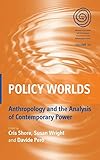Policy Worlds : Anthropology and the Analysis of Contemporary Power / ed. by Davide Però, Susan Wright, Cris Shore.
Material type: TextSeries: EASA Series ; 14Publisher: New York ; Oxford : Berghahn Books, [2011]Copyright date: ©2011Description: 1 online resource (348 p.)Content type:
TextSeries: EASA Series ; 14Publisher: New York ; Oxford : Berghahn Books, [2011]Copyright date: ©2011Description: 1 online resource (348 p.)Content type: - 9780857451163
- 9780857451170
- 306.2 22/eng/20230216
- online - DeGruyter
| Item type | Current library | Call number | URL | Status | Notes | Barcode | |
|---|---|---|---|---|---|---|---|
 eBook
eBook
|
Biblioteca "Angelicum" Pont. Univ. S.Tommaso d'Aquino Nuvola online | online - DeGruyter (Browse shelf(Opens below)) | Online access | Not for loan (Accesso limitato) | Accesso per gli utenti autorizzati / Access for authorized users | (dgr)9780857451170 |
Frontmatter -- Contents -- Introduction -- Chapter 1 Conceptualising Policy: Technologies of Governance and the Politics of Visibility -- Section I Studying Policy: Methods, Paradigms, Perspectives -- Introduction -- Chapter 2 Illuminating the Apparatus: Steps toward a Nonlocal Ethnography of Global Governance -- Chapter 3 Politics and Ethics: Ethnographies of Expert Knowledge and Professional Identities -- Chapter 4 Peopling Policy: On Conflicting Subjectivities of Fee-Paying Students -- Chapter 5 ‘Studying Through’: A Strategy for Studying Political Transformation. Or Sex, Lies and British Politics -- Chapter 6 What was Neoliberalism and What Comes Next? The Transformation of Citizenship in the Law-and-Order State -- Section II Studying Governance: Policy as a Window onto the Modern State -- Introduction -- Chapter 7 Intimate Knowledge and the Politics of Policy Convergence: The World Bank and Social Security Reform in Mexico -- Chapter 8 Shadow Governing: What the Neocon Core Reveals about Power and Influence in America -- Chapter 9 Espionage, Policy and the Art of Government: The British Secret Services and the War on Iraq -- Chapter 10 The (Un)Making of Policy in the Shadow of the World Bank: Infrastructure Development, Urban Resettlement and the Cunning State in India -- Chapter 11 Sweden’s National Pension System as a Political Technology -- Section III Subjects of Policy: Construction and Contestation -- Introduction -- Chapter 12 The Case of Scanzano: Raison d’État and the Reasons for a Rebellion -- Chapter 13 Migrants’ Practices of Citizenship and Policy Change -- Chapter 14 Integration Policy and Ethnic Minority Associations -- Chapter 15 The Elephant in the Room: Multistakeholder Dialogue on Agricultural Biotechnology in the Food and Agriculture Organization -- Afterword -- Chapter 16 A Policy Ethnographer’s Reading of Policy Anthropology -- Notes on Contributors -- Index
restricted access online access with authorization star
http://purl.org/coar/access_right/c_16ec
There are few areas of society today that remain outside the ambit of policy processes, and likewise policy making has progressively reached into the structure and fabric of everyday life. An instrument of modern government, policy and its processes provide an analytical window into systems of governance themselves, opening up ways to study power and the construction of regimes of truth. This volume argues that policies are not simply coercive, constraining or confined to static texts; rather, they are productive, continually contested and able to create new social and semantic spaces and new sets of relations. Anthropologists do not stand outside or above systems of governance but are themselves subject to the rhetoric and rationalities of policy. The analyses of policy worlds presented by the contributors to this volume open up new possibilities for understanding systems of knowledge and power and the positioning of academics within them.
Mode of access: Internet via World Wide Web.
In English.
Description based on online resource; title from PDF title page (publisher's Web site, viewed 25. Jun 2024)


